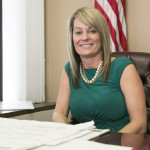(UPDATED, 4:06 p.m., with comment from Ybarra spokesman Jeff Church.)
The State Board of Education is pushing a $9.8 million all-day kindergarten plan.
The idea is to identify students who are struggling with reading — and make all-day school available to them.

Before this happens, the 2016 Legislature would have to buy off on the idea and the budget. That’s probably not a sure thing, in a state where kindergarten remains optional and in a Statehouse where pre-kindergarten bills have gotten nowhere. And while state superintendent Sherri Ybarra’s 2016-17 budget proposal seeks an additional $110 million for K-12, the $9.8 million kindergarten line item is not part of her equation.
The mechanics of the plan
Eligibility would hinge on fall scores on the Idaho Reading Indicator.
Students who do not demonstrate basic reading skills would qualify for state-funded, all-day kindergarten. Parents would decide whether to enroll their children in the full-day program.
Districts would not be required to offer all-day kindergarten, State Board spokesman Blake Youde said. However, state law already requires districts to provide 40 hours of intervention for kindergartners who do not demonstrate basic skills on the fall IRI. If the State Board plan passes, districts would have two choices: They could offer all-day kindergarten, with the state covering the costs; or offer a different intervention plan, which the state will finance, if it’s a state-approved plan.
This optional approach makes sense to Rob Winslow, executive director of the Idaho Association of School Administrators.
“A lot of schools, I don’t know where they would put another room of kindergarten,” he said.
According to State Board projections, about 4,250 students would be eligible for an all-day kindergarten program. In 2014-15, 21,553 students attended kindergarten statewide.
The all-day kindergarten plan is just the first step in a five-year, $21.5 million strategy to address literacy. And this, in turn, aligns with one of the 20 recommendations from Gov. Butch Otter’s education task force. In 2013, the group of education leaders, business representatives and elected officials recommended students demonstrate literacy mastery “before moving on to significant content learning.”
The politics of the plan
Hitching all-day kindergarten to the task force recommendations would seem to give the idea a bit of added political juice.
Legislators have signed on with the task force’s costliest proposals — the 2015 teacher career ladder law has its origins in the task force report, and legislators have begun restoring school districts’ operational budgets, which had been cut by $82.5 million during the recession.
It’s not yet clear whether Otter will recommend the $9.8 million. Otter usually keeps details of his budget plan under wraps until January, and the start of the legislative session. But repeatedly — and both before and after his 2014 re-election — Otter has touted the task force’s recommendations as a bipartisan, consensus-based five-year plan to improve K-12 education.
Ybarra supports the concept behind the optional all-day kindergarten plan, spokesman Jeff Church said Thursday, but it does not appear in the budget proposal she released in early September. Her budget includes $5 million for literacy programs — which could include all-day kindergarten, reworking the IRI or other initiatives.

State Sen. Steven Thayn — one of the Legislature’s most prominent critics of pre-K legislation — has doubts about the all-day kindergarten plan as well. He thinks a full day of classroom instruction could backfire, especially for boys who have attention deficit disorder.
Thayn says he will take a skeptical look at the State Board proposal, and he expects other lawmakers to do the same.
“I think there’ll probably be some pushback,” said Thayn, who serves on the budget-writing Joint Finance-Appropriations Committee and is vice chairman of the Senate Education Committee.
A larger debate
Even though kindergarten is optional in Idaho, all-day kindergarten is hardly a new concept. In 2014-15, 49 of Idaho’s 115 districts and eight charter schools offered all-day kindergarten to at least some of their students. In some cases, districts have used state dollars to pick up half of the cost, billing parents for the extra half day of school.
But a state-funded expansion of kindergarten comes as lawmakers continue to debate launching into state-funded preschool — if only on a limited basis. Idaho is one of only six states that does not fund pre-K. For the past two sessions, bills to create a state-funded pre-K pilot program have not made it out of the House Education Committee.
Another version of a pre-K bill is in the works, and Thayn expects the pre-K debate to continue in 2016.

Beth Oppenheimer, executive director of the Idaho Association for the Education of Young Children, has not looked at the all-day kindergarten proposal in detail. But she says all-day kindergarten is a “really great step” for children who aren’t prepared for school.
Oppenheimer doesn’t see all-day kindergarten and pre-K as an either-or proposition. Extra help in kindergarten can help at-risk students catch up, she said, while pre-K can prepare young children for school.
